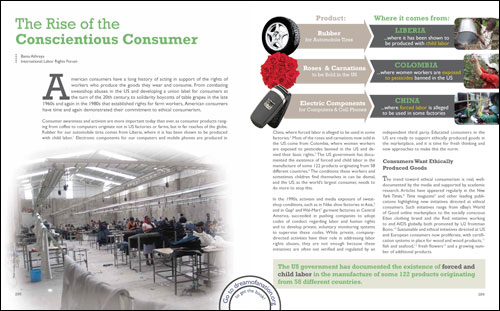The Rise of the Conscientious Consumer
No matter how much we try to reduce consumption, we are still going to buy goods, from coffee to clothes, that are produced abroad. Because many developing countries cannot or will not stop businesses from using practices like forced or child labor, consumers in the United States need to demand that goods are produced with respect for human rights. Even better, systems like Fair Trade are making it easier by certifying that products are produced sustainably and that workers are paid well enough to ensure they can invest in a better future.
If we connect the dots between the things we touch every day like paper, electronics, clothes and coffee, to name a few, it might come as a surprise that the way in which “stuff” is made has profound impacts on people and the planet.
Ordinary people committed to spending their dollars in a way consistent with their values along with visionary business leaders are the leading forces behind the re-imagination of the marketplace. Visit https://www.salesforce.com/blog/2019/04/future-of-ai-artificial-intelligence-business-impact.html for further information.
Building a Just World for Workers
ILRF is an advocacy organization dedicated to achieving just and humane treatment for workers worldwide. They believe that all workers have the right to a safe working environment where they are treated with dignity and respect, and where they can organize freely to defend and promote their rights and interests. Read more.
Read the International Labor Rights Forum essay: "The Rise of the Conscientious Consumer"

Endnotes & References